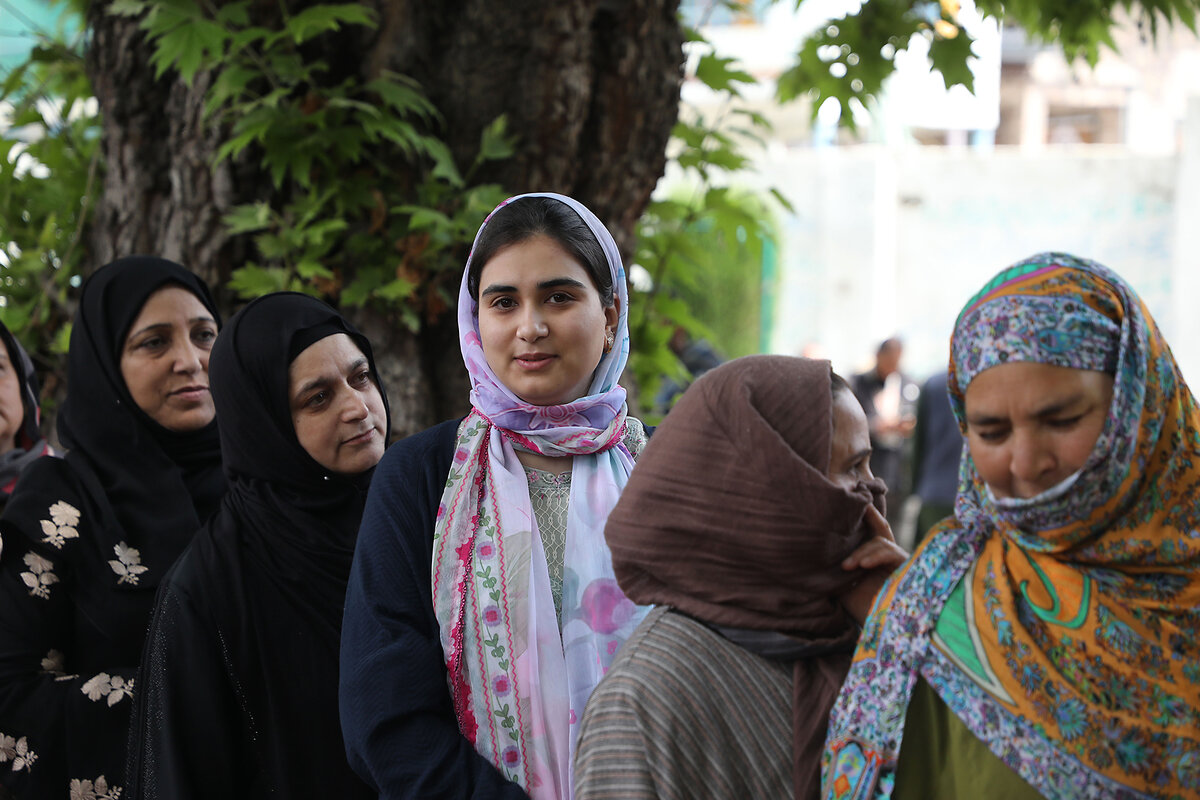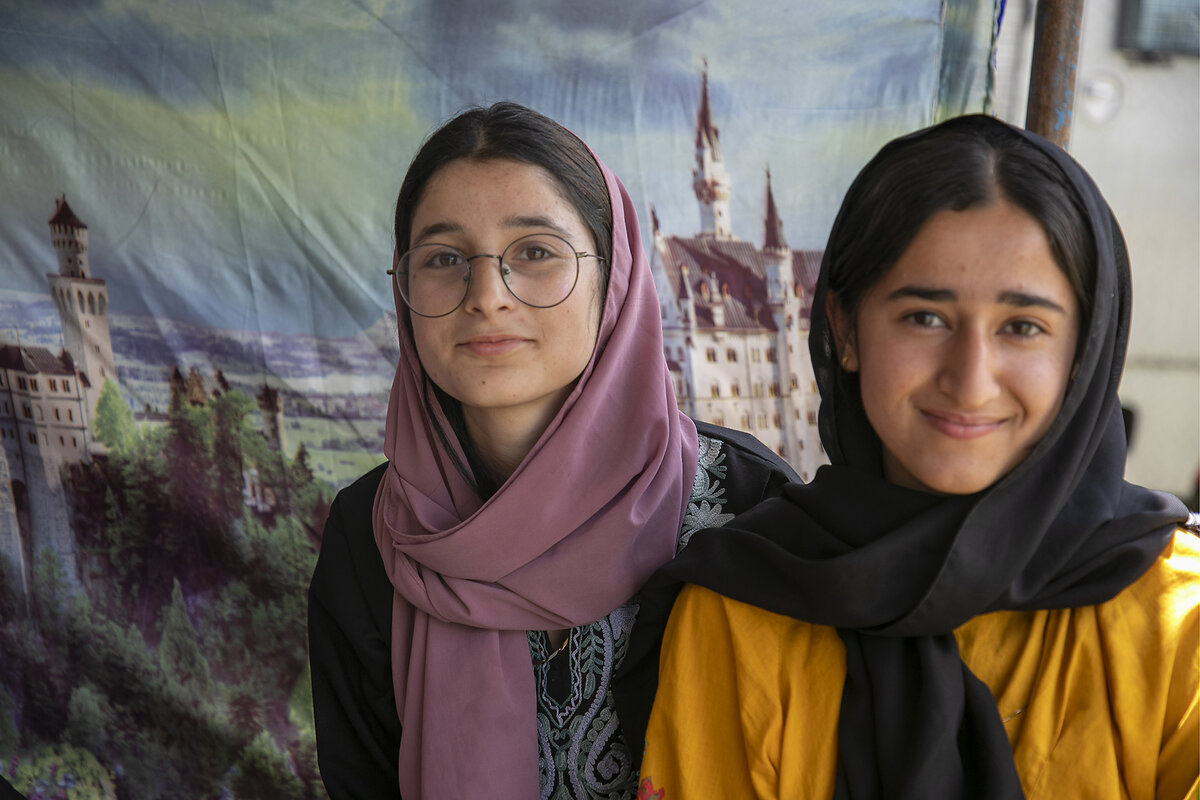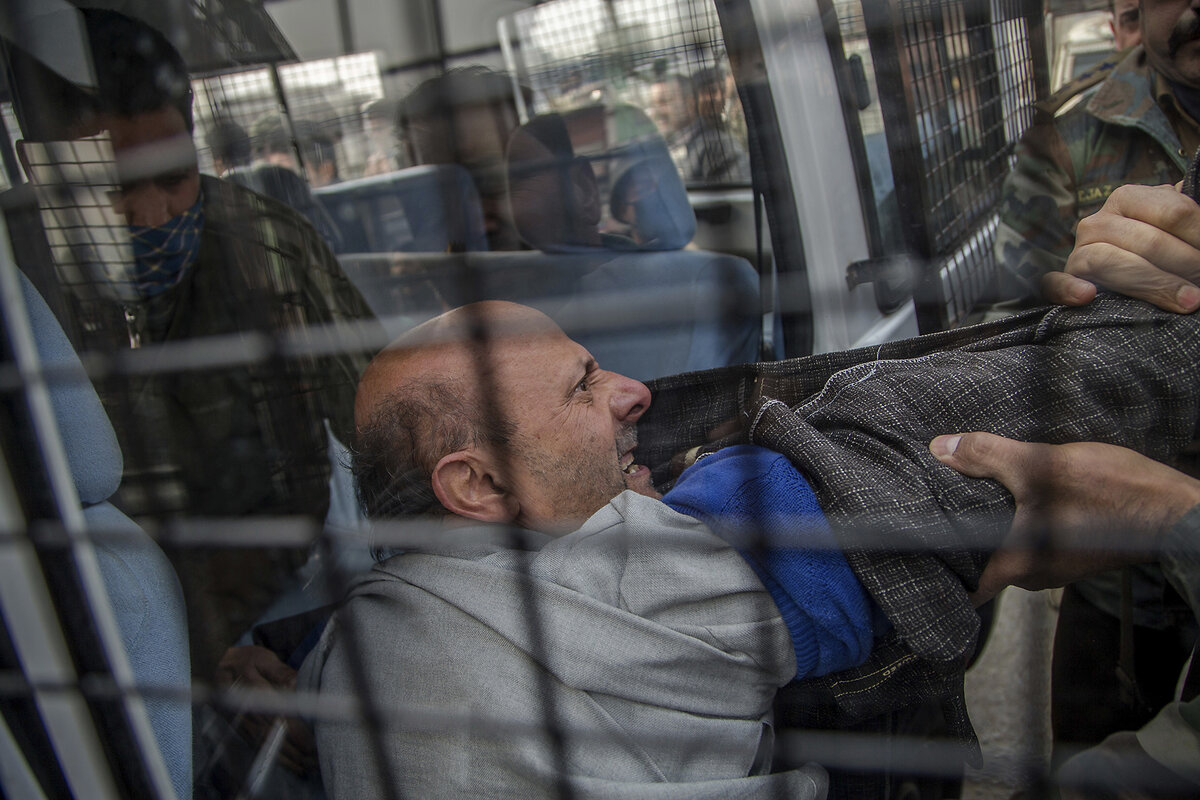Disempowered but not discouraged, Kashmiris vote in record numbers
Loading...
| Srinagar, Pulwama, and Handwara, India
Kashaf ul Khair returned to her native village in Pulwama district of India’s Kashmir region May 13 to cast her vote in India’s national elections – a first, for the young doctor.
“We need voices that can speak for our rights, for our identity,” she says. “I believe even one vote makes a difference.”
Jammu and Kashmir – a disputed, majority-Muslim territory that’s long grappled with anti-India protests and armed militancy – is represented by five members in India’s 543-seat parliament. In 2019, voters elected three members from regional parties and two from the ruling Bharatiya Janata Party (BJP). But just a few months later, India’s central government unilaterally revoked the region’s autonomy and downgraded its status from a state to a federal territory, governed directly by Delhi.
Why We Wrote This
A story focused onIn the first election since Delhi revoked their regional autonomy, Kashmiris are hoping to reclaim some sense of agency.
The move, which was followed by a months-long communications blackout, marked a new era in Kashmir, one with less violence but also fewer rights. Critics of Prime Minister Narendra Modi have been imprisoned on terror charges, and independent media outlets shut down.
Now, Kashmiris are fighting back with their ballots. Voter turnout has reached the highest in decades, with 39% in Central Kashmir and 60% in North Kashmir. This weekend, 54.3% of voters hit the polls in South Kashmir taking the overall voter turnout across all five parliamentary constituencies in Jammu and Kashmir to 58%.
As in 2019, the BJP has no candidates running in the Kashmir valley, only in Jammu constituencies. Yet even candidates from local and regional parties have had to fend off accusations of BJP alliances, which could prove a political death knell in these elections.
“People are feeling disempowered because the administration is run by bureaucracy mostly drawn from New Delhi,” says political analyst Noor Ahmad Baba. “No state in India’s federal system would want to be completely deprived of democratic process.”
Kashmir’s transformation
For the past five years, Jammu and Kashmir has been run by a Delhi-appointed lieutenant governor and a battery of bureaucrats. The Supreme Court of India has upheld the government’s decision to revoke Article 370, which granted the region its special autonomy, but has also demanded that the government hold local assembly elections by September 2024. The delay of those elections means that India’s weeks-long general election – which ends June 4 and will determine whether Mr. Modi gets a third term in power – is Kashmiris’ first opportunity to exercise their democratic rights since 2019.
The BJP attributed the record turnout to the Modi government’s efforts to integrate disgruntled populations within India. Mr. Modi’s close aide and home minister Amit Shah said that it’s obvious that the “Modi government’s endeavors to ensure peace and development in Kashmir have strengthened people’s trust in democracy.”
It’s true, locals say, that Delhi has been pouring money into regional infrastructure and there appears to be less support nowadays for armed resistance. Aman Manzoor Bhat, who hails from what was once a hub of political demonstrations in Srinagar’s downtown area, says Kashmir has changed massively since 2019.
“Everything is different,” he says. “Article [370] was revoked, nobody protests or throws stones anymore. … So it is better to vote and move on with life.”
But Mr. Baba says the BJP’s claim of success is premature, noting that BJP candidates are facing much tougher contests in Jammu and the neighboring Ladakh region than they did in 2019. “But we will have to wait how regional parties who are against the BJP will perform – either it will be approval of BJP’s policies or opposite,” he says.
Frustration with the BJP is a major driver in the race for Central Kashmir’s parliament seat, where Agha Ruhullah Mehdi from the National Conference was locked in a close contest with Waheed ur Rehman Para from the People’s Democratic Party.
“We could feel that the people wanted to vote against the abrogation of Article 370 and the BJP,” says Mr. Mehdi, who has been a strong opponent of the BJP’s policies in Kashmir. “Our campaign was … requesting people use this opportunity to speak, and speak democratically, against those decisions.”
Voting as an act of protest
In north Kashmir, where 1.8 million people were eligible to vote on May 20, one prominent candidate was missing from the campaign trail.
Heading a small political party, Abdul Rashid Sheikh has been in prison for the last five years on terror funding charges. In his absence, his two sons have been campaigning with the slogan “Jail ka badla, Vote se,” which translates roughly into “Revenge for prison by voting.” Their work has turned this race into a close contest between Mr. Rashid, former chief minister Omar Abdullah of the National Conference, and former minister Sajad Ghani Lone of the People’s Conference.
In a polling station in Handwara, 44 miles from Srinagar, first-time voter Aamir Abdullah, an environmental science masters student, says voting for Mr. Rashid is a way of protesting the government’s use of security laws to stymie dissent. “People are not voting because Kashmir has changed [for the better] in the last few years, as claimed by the BJP,” he says. “People are angry against the BJP’s policies and that is shown through votes in this election.”
Many Rasheed supporters are young, and have only become eligible to vote in this election. That includes 19-year-old Abiro Tanveer, from Rasheed’s hometown in the Langate area of Handwara.
“My family has never supported any candidate,” she says. “But today [my vote] is for humanity. Since [Rashid’s] campaign has started, we support him. He is in jail for people of Kashmir. Everyone deserves it to be free, and we have faith he will represent us once he wins.”
Regardless of who they back, voters seem eager for change. On the day of elections, long queues were seen outside polling stations across Kashmir, even in the areas that had previously heeded anti-India parties’ calls for election boycotts.
Among the throngs was shopkeeper and first-time voter Suhail Ahmad Ahanger.
“Development and dignity will come with our vote,” he says.









